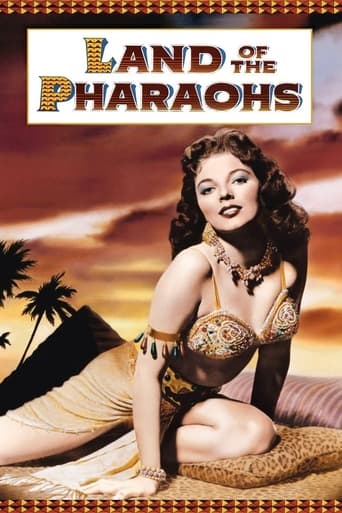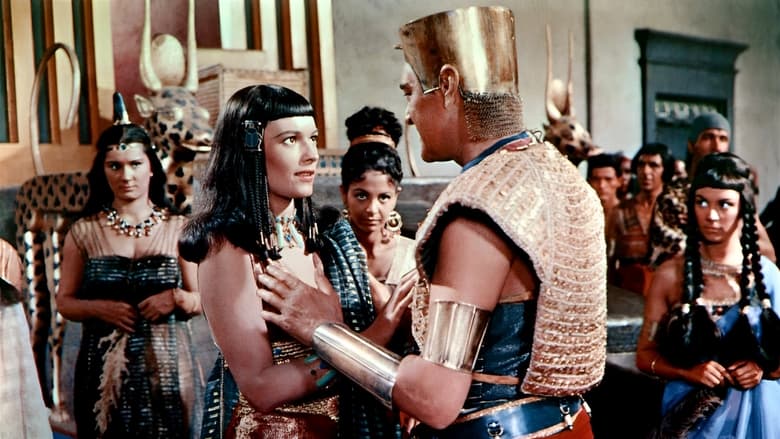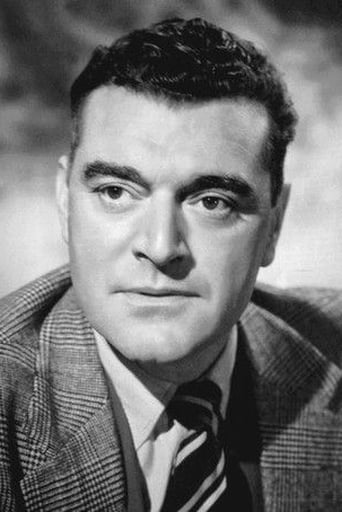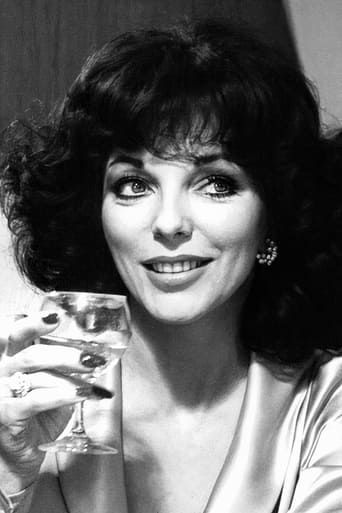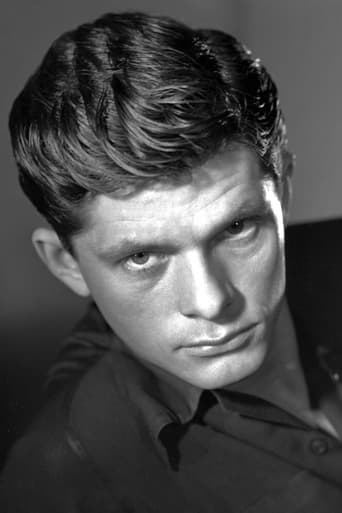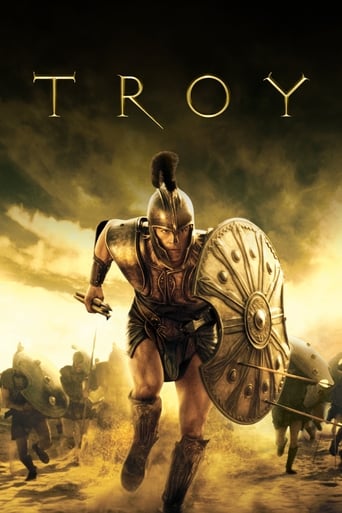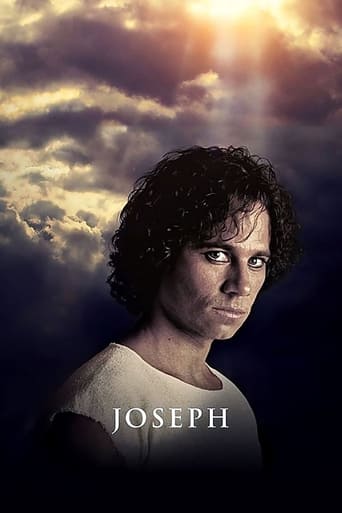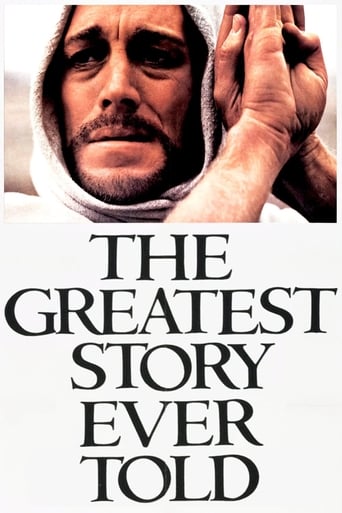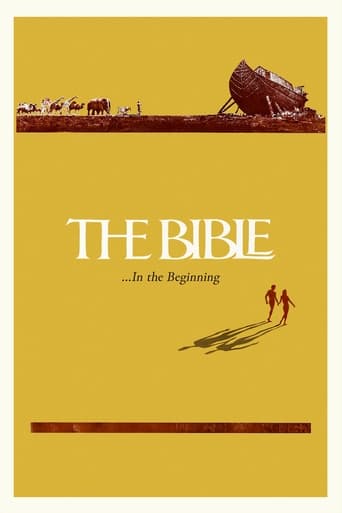Land of the Pharaohs (1955)
A captured architect designs an ingenious plan to ensure the impregnability of the tomb of a self-absorbed Pharaoh, obsessed with the security of his next life.
Watch Trailer
Cast


Similar titles
Reviews
Technically, "Land of the Pharaohs" is pretty good. All the dialogue was looped in London (where the film was edited), so that not only do we have all the principals voicing their own lines, but harmonizing English accents given to the large roster of anonymous Italian support and bit players led by young Piers Giagnoni (and probably — the dubbing is so skillful, it's commendably difficult to tell — Luisa Boni). Less unobtrusive is an obvious difference in grading between the 2nd unit photography in Egypt (presumably the work of Russell Harlan) and that of the main unit both in Egypt and Rome. (On second thoughts, I incline to the view that three cinematographers were used: An unsung lens-man — maybe Skeets Kelly — with Noel Howard, Harlan with Hawks in Egypt, Garmes with Hawks in Rome). It must be admitted that most of Hawks' fans do view "Land of the Pharaohs" with a mixture of dismay and incredulity. They have all actually seen this one. After all it's been on television so many times they could scarcely avoid it. (Of course standard TV is no way to view this movie. Although Hawks does center most of his interior action in the middle of the frame, the full impact of the vast location exteriors is lost. Principal cause for complaint is the acting. The principal target of the critics' wrath is Joan Collins. (Actually I thought she was pretty good. She often seems to be sending herself up and playing her ridiculous lines with a wonderful sense of mischievous tongue- in-cheek. I've no doubt her apparent flair was not the result of deliberate artifice but simply due to her inexperience, but it's the end result that matters. Hers is a satirically spirited performance. And she looks great too). Hawkins is usually given the thumbs up. (I thought he was miscast, but managed the role with moderate credibility considering the heavy weather he makes of most of his lines). Dewey Martin is usually passed over in silence, though his is by far the least convincing portrait and his American looks and accent are way out of place. I will admit that Sydney Chaplin is even less engaging and that James Hayter seems equally anachronistic, but their roles are much smaller. Although handicapped by obvious aged make-up, Justice makes a fair fist of his captive architect. Kerima's portrait of the queen is so wholly engaging, I wish that her part was much larger. Oddly enough, it is Alex Minotis who effortlessly walks away with the film's acting honors. He is always personable, convincing, agreeable and even charismatic. In scenes with other players who often seem dumbfounded by their lines, he is a tower of assurance and confidence. His high priest is never less than totally appealing.The scriptwriters, headed by the Nobel Prizewinning William Faulkner of all people, have come in for a good deal of criticism. Trite dialogue, banal, imitative plotting (the hackneyed flute-snake incident, for example, stolen from a hundred books including Romer Godden's The River) and weak characterization are all just jibes. As a peg on which to hang the spectacle, though, the script is strong enough.As a spectacle, "Land of the Pharaohs" succeeds handsomely. Hawks has directed the crowd scenes with flair, using the full resources of the CinemaScope screen, and even a few pan and traveling crane shots. The camera-work is often intriguing, and the music score is so wonderfully audacious and distinctively atmospheric, it's hard to credit it wasn't even nominated for a Hollywood award. Certainly Hawks thought so highly of it that he plugs it in the film's advertising, a rare honor for a composer so far as a non-musical is concerned.
As tribute to the all-conquering mighty Pharaoh Khufu, Jack Hawkins, Princess Nellifer, Joan Collins, offers herself in place of spoils to fill the pharaoh's treasure vaults given that she's just a poor ruler from an even poorer country. In no time at all, she becomes the fave of the pharaoh using her seductive wiles and allure in an ambitious scheme to usurp the throne, letting nothing and no-one, including the current queen, her son and pharaoh himself stand in her way. Long regarded by many in Hollywood as the poor man's Liz Taylor, Collins' makes the most of her own flawless beauty, and, talent as a legitimate actress in a once-in-a lifetime role as Nellifer. She even manages to overshadow and upstage Hawkins in their scenes together. Other points of interest include our being afforded an insider's POV of how the pyramids might have been constructed from drawing board stage and labyrinthine interior to stone apex. Filmed on location, director Howard Hawks enlisted some 9,787 extras actually recruiting from the ranks of the modern Egyptian Armed Forces. Novelist William Faulkner co-wrote (but didn't necessarily improve upon) the screenplay. Spoiler alert: In the classic tradition of Greek tragedy, Collins' receives her just reward in what has to be the ultimate cinematic revenge.
I have always thought of Howard Hawks as one of the most versatile directors of his generation. Whereas many of his contemporaries tended to become associated with one particular genre (DeMille with epics, Hitchcock with suspense, Ford with westerns), Hawks could turn his hand to just about any type of film, including crime dramas ("Scarface"), film noir ("The Big Sleep"), comedies ("His Girl Friday"), war movies ("To Have and Have Not"), musicals ("Gentlemen Prefer Blondes") and westerns ("Rio Bravo"). "Land of the Pharaohs" was his only venture into DeMille's territory, the epic. This film can be seen as the middle episode of an unofficial trilogy of epics on Egyptian themes, coming between "The Egyptian" from 1954 and "The Ten Commandments" from 1956. It is a fictionalised account of the building of the Great Pyramid of Khufu. The main characters are the Pharaoh Khufu himself, his second wife Nellifer, his architect Vashtar and his High Priest and lifelong friend Hamar. Khufu is obsessed with securing his place in the afterlife, and has ordered the construction of a magnificent pyramid to serve as his tomb. He has engaged Vashtar to make it robber-proof. Vashtar has little cause to love his royal master; he is a Cushite, captured in battle by the Egyptians after his ingenious defence systems nearly saved his own people from defeat. Moreover, he knows that he himself will be put to death after Khufu's funeral to prevent the secrets of the tomb from being revealed. Nevertheless, he reluctantly agrees to help with the project as Khufu has promised him that if he does he will set free those Cushites being held as slaves in Egypt. The land of Cush occupied, roughly speaking, the same territory as the modern-day Sudan, so its inhabitants doubtless had skins several shades darker than James Robertson Justice. In the fifties, however, the unofficial Hollywood colour-bar made it difficult for black actors to obtain leading roles, so the Cushites are here presented as a Caucasian people. Moreover, the film-makers seem to have intended to draw a parallel between the Cushite slaves here and the Israelites held in slavery in Egypt in Old Testament times. Indeed, it was probably only an unusual (by Hollywood standards) concern for historical accuracy which prevented the scriptwriters from making Vashtar an Israelite. (Khufu reigned long before the events narrated in the Book of Exodus).Nellifer is just as preoccupied with securing her earthly wealth and power as her husband is with securing his place in the next world. Hawks was well known for the concept of the "Hawksian woman", female characters in his films who are not only beautiful but also strong, determined and unafraid to speak their mind; examples include the characters played by Katharine Hepburn in "Bringing Up Baby", Rosalind Russell in "His Girl Friday", Lauren Bacall in "To Have and Have Not" and Jane Russell in "Gentlemen Prefer Blondes". Nellifer can be seen as a Hawksian woman gone to the bad, the strong, independent-minded woman as villainess rather than heroine. The role is played by the young Joan Collins, only 22 at the time, in her first American film. During her relatively brief Hollywood heyday (roughly 1955-1962) Collins was more often cast as virtuous young heroines, as in her other epic "Esther and the King", but since the seventies she has more often been associated with scheming, seductive temptresses, and Nellifer is an early example of this sort of character, Alexis Carrington in a previous incarnation. Unusually for an American film, none of the major parts are played by Americans. Three of the four main roles are played by British actors (Collins, Justice and Jack Hawkins as Khufu), and the fourth, the wise and humane priest Hamar, by a Greek, Alexis Minotis. Justice never really seems at home here; he comes across more like a prosperous Home Counties professional man than a native of Ancient Cush. Perhaps he reminded me too much of his most famous creation, the eminent surgeon Sir Lancelot Spratt in the "Doctor in the House" comedies. Collins, however, is splendid in the sort of role which she was later to specialise in, and Hawkins is good as the autocratic Pharaoh, too blinded by his obsession with the next life and his infatuation with Nellifer to realise the harm he is doing to his country. When it came out in 1955, the film was not a success, either critically or at the box-office. To have directed a flop was a new experience for Hawks, most of whose films had been very successful, and this may explain why he did not make any films for the next four years. (His next was to be "Rio Bravo" in 1959). He never returned to the epic again. Yet for those of us who love the epic style, there is much to enjoy in "Land of the Pharaohs" today. It has an intelligent, literate script (the distinguished novelist William Faulkner was one of the scriptwriters), centred upon those familiar epic concepts of freedom and slavery, good and evil, love and ambition. Although there are no battle scenes, or anything as thrilling as the chariot race in "Ben Hur", it nevertheless offers plenty of spectacle, particularly during the scenes of the building of the pyramid, with a cast of literally thousands. I would not rate it quite as highly as some of the classics of the genre, such as "The Ten Commandments" or "Spartacus", but it can bear comparison with something like "The Egyptian", which I have long regarded as one of the best "second division" epics. 7/10
What's that, Joan Collins? You want all my pharaoh's treasure? Here you go, sweetheart, take the key to the vault. You want my wristwatch? I got 37 bucks in my wallet that ain't doing nuthin'. Take it, pretty girl. I love you, Joan.Joan Collins is hot as the new princess in town in this episodic costume drama which horribly miscasts Jack Hawkins as the big wheel of these particular pyramids. It takes awhile, but he finally gets gutted, though he dies rather slowly.... hey Jack, will you drop dead already? I would have pushed him into some quicksand at the earliest opportunity. A long and mostly boring film, the ending totally sucks.As for Joan... Hey beautiful! Wanna wear my crown and be Pharaoh? I'll kiss your feet, Joan - and anything else you want me to kiss.

